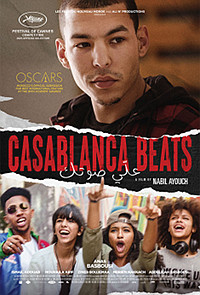| SHADOWS ON THE WALL | REVIEWS | NEWS | FESTIVAL | AWARDS | Q&A | ABOUT | TALKBACK | |||||||||||||||||||||||||||||
 Shadows off the beaten path Shadows off the beaten pathIndies, foreign, docs and shorts...
On this page:
CASABLANCA BEATS |
I LOVE AMERICA |
VORTEX
| |||||||||||||||||||||||||||||
| See also: SHADOWS FILM FESTIVAL | Last update 27.Apr.22 | |||||||||||||||||||||||||||||
|
Casablanca Beats Review by Rich Cline | 
CANNES FILM FEST Is it streaming?
| 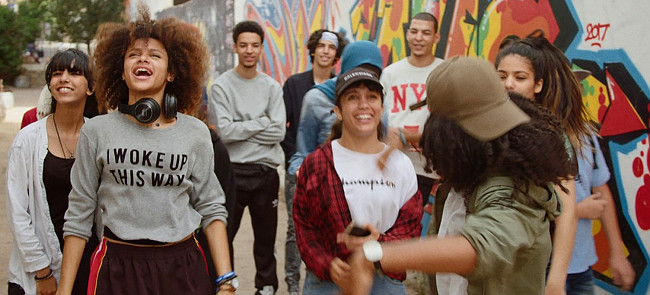 A charge of electricity runs through this film, which explores global youth culture through the eyes of lively teens in Morocco who are playing versions of themselves on-screen. Their society of course brings its distinct challenges, but their attitudes and yearnings are recognisable anywhere. Shooting over two years, filmmaker Nabil Ayouch assembles the story as a workshop-style project that mixes drama and documentary, which makes it powerfully personal. A rapper turned teacher, Ana (Basbousi) is now living in his car while starting a new job in a community arts centre in the Casablanca suburb Sidi Moumen. His students are full of energy and opinions, and he challenges them to channel truth into their performances, rather than simply echoing the expected anger in most street-style music. As they write songs and record them in the centre's disused studio, they have provocative discussions about the heavy impact of religion in their society. And a few brave female rappers want to take on the unjust system. Each of these kids has a clear-eyed view of the rules they live under, most of which come from so-called devout men who say they suppress women to protect them, but are actually abusive and bigoted. The students' superb songs bristle with knowing observations about the hypocrisy and greed they see everywhere. And dramatised scenes with families illuminate the closed-minded system they face on a daily basis. Some are forcibly dragged from the school by their outraged parents, others have more personal crises in the way they consider their family connections and religious beliefs. As Ana, the charismatic Basbousi reveals fascinating layers of bravado and compassion. His interaction with these teens is sometimes harsh, simply because he's challenging them to think through their beliefs. And he also clearly cares for them deeply. Three or four of the kids stand out from the crowd with their remarkable skills at rapping, singing and dancing. But it's their internal journeys that are the most haunting, as they desperately want to make the world a better place than their parents created for them. This makes the film a wonderful expression of hope. While the dialog grapples meaningfully with the Muslim faith and issues of poverty and gender discrimination, it pointedly avoids the thornier theme of sexuality. There are hints of relationships among the characters, but Ayouch avoids depicting anything overtly while carefully noting that within this culture it may be important to take some respectful small steps rather than overthrow everything at once.
|
| I Love America Review by Rich Cline | 
| 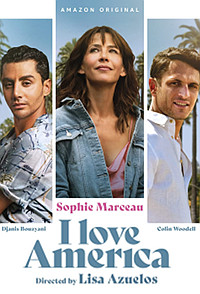 dir Lisa Azuelos scr Lisa Azuelos, Gael Fierro prd Eleonore Dailly, Edouard de Lachomette with Sophie Marceau, Djanis Bouzyani, Colin Woodell, Carlease Burke, Keller Wortham, Alice Riu de Labarriere, Selena Andrie, Saul Benchetrit, Syrus Shahidi, Sophie Verbeeck, Florence Viala, David Owe release Fr 11.Mar.22, US/UK 29.Apr.22 22/France Amazon 1h44 Is it streaming?
| 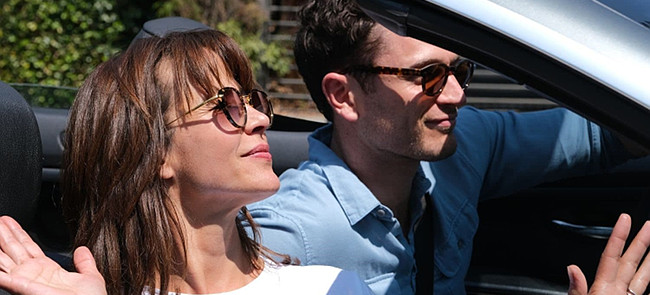 Taking an earthy, realistic approach to both the imagery and the voiceover narration, writer-director Lisa Azuelos gives this autobiographical comedy-drama a strongly personal kick. The film has a gently meandering tone, lightly exploring a mature woman's attempt to get her personal life and career going after raising her children. It's frequently amusing without ever being a laugh-out-loud comedy. But it's refreshing that Azuelos never strains for a punchline. Determined to start a new life, middle-aged filmmaker Lisa (Marceau) moves from Paris to Los Angeles, where sparky best friend Luka (Bouzyani) has been for five years. He convinces her to use a hook-up app and, after a few dating mishaps, she meets the smart and much younger John (Woodell). While trying not to get her hopes up, she begins to enjoy being with someone again, even if a fortuneteller (Burke) tells her she won't fall in love. Meanwhile, her life back in France keeps haunting her through memories of her parents, siblings and children. Opening with a flashback, the film continually cycles around to Lisa's turbulent relationship with her diva mother (Verbeeck) and playboy father (Shahidi), with Lisa played at 4, 8 and 12 by Labarriere, Andrie and Benchetrit. These anecdotal snippets add texture, even if they feel random. But then, so do the series of misadventures Luke leads Lisa into. Somewhat mysteriously, money isn't an issue for either of them, but romance is. And both are in need of the security a relationship might bring. Relaxed performances match the film's breezy tone, remaining grounded and sympathetic. Marceau has terrific off-handed charm as a woman rediscovering her passions and putting her past into context. Her growing connection with Woodell's likeable John is enjoyable, even if it resembles a standard romcom. Marceau also has terrific chemistry with Bouzyani, who camps it up without becoming a gay cliche. His journey may also be predictable, but it has its own involving impact. Azuelos clearly loves Los Angeles, skilfully showcasing a range of gorgeous locations. The humour is of the real-life variety, gently poking fun at the ironies of the modern world. This allows several strong, serious issues to bubble up, often surprising the characters. One recurring theme knowingly depicts how disappointing long-awaited reunions can be. Although thankfully, that's not always the case. The film also reminds us that we need to bring joy into our lives, not to help take our minds off the darker times but to put them into perspective.
|
| Vortex Review by Rich Cline | 
| 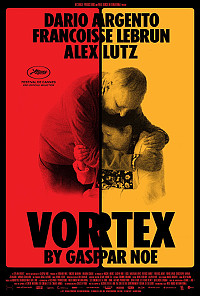 dir-scr Gaspar Noe prd Edouard Weil, Vincent Maraval, Brahim Chioua with Dario Argento, Francoise Lebrun, Alex Lutz, Kylian Dheret, Corinne Bruand, Joel Clabault, Eric Fourneuf, Vuk Brankovic, Kamel Benchemekh, Charles Morillon, Frank Villeneuve, Philippe Rouyer release US 29.Apr.22, UK 20.May.22 21/France 2h20 CANNES FILM FEST Is it streaming?
| 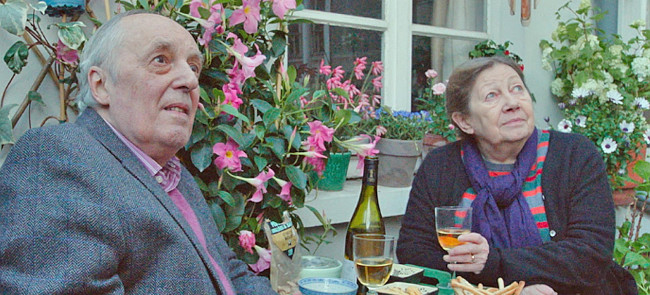 Argentine-born French filmmaker Gaspar Noe never makes movies that are easy to watch, but they are always deeply human. This meditation on ageing, memory and grief is perhaps one of the most original, unsettling horror movies ever made. With its distinctive double-frame visual style and a gritty approach to characters and situations, the film is bold and powerfully involving, even if it feels both grim and somewhat overlong. In a Paris apartment, a writer (Argento) struggles to care for his psychiatrist wife (Lebrun), whose dementia is accelerating. When she vanishes, he heads into the street to find her. And when she prescribes both of them stronger meds, he can't remember which pills are whose. Their son Stephane (Lutz) and his toddler son Kiki (Dheret) visit, but Stephane's personal issues make it difficult for him to help his parents. He thinks they should be in a care home, but his dad refuses, ignoring Stephane's concerns about what might happen if one of them falls. After opening with this couple sweetly having a drink on their terrace, the film splits into two screens, sometimes taking dual perspectives within a scene and other times following characters on their own. Edits are rendered as blinks, which makes watching the film almost unnervingly voyeuristic, augmented by the unfiltered, intimate performances. It's only in the pile-up of enormous issues that the story feels fictional, leading bracingly real people into a series of potentially cataclysmic situations. Nobody seems to be acting at all. Argento is superb as the blithely dismissive husband, putting off decisions about not just their living situation, but also about his openly acknowledged mistress (Bruand) and his new book about the dream-like qualities of cinema. Lebrun is also excellent as she wavers between lost and lucid, going about her daily routine with a vague (or sometimes razor-sharp) understanding of her own condition. And Lutz also has a strong presence as their seriously troubled son. As outside observers, we see the potential for calamity everywhere around this fragile family, which adds an undercurrent of growing terror as the situation develops. And things get very dark indeed as Noe follows these people in some very bleak directions. What's most remarkable about the story is its complete lack of the usual sentimental hopefulness seen in most movies about dementia and mortality. This unflinching film is continually grounded in its realistic perspective, letting us find ourselves in each moment. It may be chilling, but it's so honest that we can't help but be exhilarated as well.
| 
See also: SHADOWS FILM FESTIVAL © 2022 by Rich Cline, Shadows
on the Wall
HOME | REVIEWS | NEWS | FESTIVAL | AWARDS
| Q&A | ABOUT | TALKBACK | | ||||||||||||||||||
